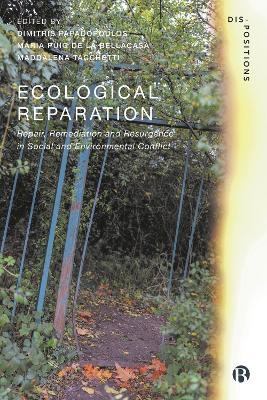
Ecological Reparation
Bristol University Press (Verlag)
978-1-5292-3954-6 (ISBN)
The threat of social-environmental destruction is a fundamental challenge for those who are interested in creating and maintaining liveable worlds. This volume will bring together international scholars in science and technology studies, environmental studies, ecological humanities, art and design, geography and other social sciences to explore practices of repairing damaged and precarious ecologies through various societal, environmental and material involvements across different locations and geographies. Contributions will offer novel theoretical perspectives and empirical insights on the reparative and insurgent capacity of mending ecologies to craft relations of care and sustenance of human and nonhuman communities.
The volume will be divided into several sections that are organized around a series of concepts that denote countervailing forces, processes and movements of damaging and repairing. Each section will consist of two or three contributions that offer experimental explorations of what ecological reparation means, and each section will begin with a short note that briefly describes the key concepts and issues that will be explored within.
Dimitris Papadopoulos is Professor of History of Consciousness at the History of Consciousness Department, University of California, Santa Cruz Maria Puig de la Bellacasa is Professor of History of Consciousness at the History of Consciousness Department, University of California, Santa Cruz Maddalena Tacchetti is Lecturer at the School of Business and Creative Industries, University of the West of Scotland
Introduction: No justice, no ecological peace: The groundings of ecological reparation (Dimitris Papadopoulos, Maria Puig de la Bellacasa, Maddalena Tacchetti)
Acknowledgements
PART I Depletion: Resurgence
1. Experiments in situ: Soil repair practices as part of place-based action for change in El Salvador (Naomi Millner)
2. Hesitant: three theses on ecological reparation (otherwise) (Manuel Tironi)
3. The False Bay Coast of Cape Town: A Critical Zone (Lesley Green and Vanessa Farr)
PART II Deskilling: Experimenting
4. Reflections on a mending ecology through pastures for life (Claire Waterton)
5. Fab Cities as Infrastructures for Ecological Reparation: Maker Activism, Vernacular Skills, and Prototypes for Self-Grounding Collective Life (Atsuro Morita and Kazutoshi Tsuda)
6. The Cosmoecological Workshop: Or, How to Philosophise with a Hammer (Martin Savransky)
PART III Contaminating: Cohabiting
7. Multispecies mending from micro to macro: Biome restoration, carbon recycling, and ecologies of participation (Eleanor Hadley Kershaw)
8. Involvement as an ethics for more than human interdependencies (Nerea Calvillo)
9. From Museum to MOB (Timothy Choy)
PART IV Enclosing: Reclaiming Land
10. Land in Our Names: Building an Anti-Racist Food Movement (Sam Siva)
11. Land reparations and ecological justice – an Interview with Sam Siva (Maria Puig de la Bellacasa and Dimitris Papadopoulos)
12. Waste, improvement and repair on Ireland's Peat Bogs (Patrick Bresnihan and Patrick Brodie)
13. New Peasantries in Italy: Eco-commons, Agroecology and Food Communities (Andrea Ghelfi)
14. “Obedecer a la Vida”: Environmental Citizenship Otherwise? (Juan Camilo Cajigas)
PART V Loss: Recollecting
15. Travelling Memories: Repairing the past and imagining the future in medium-secure forensic psychiatric care (Steven D. Brown, Paula Reavey, Donna Ciarlo and Abisola Balogun-Katung)
16. Conversations on benches (Leila Dawney and Linda Brothwell)
17. Curating reparation and recrafting solidarity in post-accord Colombia (Fredy Mora-Gámez)
PART VI Representing: Self-governing
18. Commons-based mending ecologies (Doina Petrescu and Constantin Petcou)
19. Ri-Maflow: des-pair, resistance and re-pair in an urban industrial ecology (Marco Checchi)
20. Chilean streets: An archive against the grain of History (Cristobal Bonelli and Marisol de la Cadena)
PART VII Isolating: Embodying
21. (Un)crafting ecologies: actions involving special skills at (un)making things humans with your hands (Eliana Sánchez-Aldana)
22. Cultivating Attention to Fragility: The Sensible Encounters of Maintenance (Jérôme Denis and David Pontille)
23. Technological black boxing versus ecological reparation: From encased-industrial to open-renewable wind energy (Aristotle Tympas)
PART VIII Growth: Flourishing
24. Algorithmic Food Justice (Lara Houston, Sara Heitlinger, Ruth Catlow and Alex Taylor)
25. Being affected by páramo: Maps, landscape drawings, and a risky science (Alejandra Osejo and Santiago Martínez Medina)
26. Ordinary Hope (Steven J. Jackson)
| Erscheinungsdatum | 01.11.2023 |
|---|---|
| Reihe/Serie | Dis-positions: Troubling Methods and Theory in STS |
| Zusatzinfo | 91 Illustrations, black and white |
| Sprache | englisch |
| Maße | 156 x 234 mm |
| Themenwelt | Naturwissenschaften ► Biologie ► Ökologie / Naturschutz |
| Sozialwissenschaften ► Soziologie | |
| ISBN-10 | 1-5292-3954-0 / 1529239540 |
| ISBN-13 | 978-1-5292-3954-6 / 9781529239546 |
| Zustand | Neuware |
| Haben Sie eine Frage zum Produkt? |
aus dem Bereich


